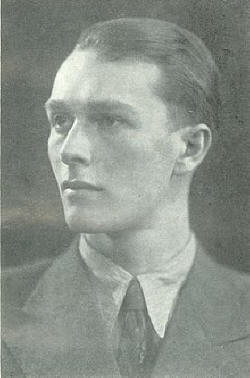Queer Places:
Central Cemetery, Avram Iancu Street 24-26, 400083 Cluj-Napoca, Romania
 Ion
Negoiţescu (August 10, 1921 – February 6, 1993) was a Romanian literary
historian, critic, poet, novelist and memoirist, one of the leading members of
the Sibiu Literary Circle. A rebellious and eccentric figure, Negoiţescu began
his career while still an adolescent, and made himself known as a literary
ideologue of the 1940s generation. Moving from a youthful affiliation to the
fascist Iron Guard, which he later came to regret, the author became a
disciple of modernist doyen Eugen Lovinescu, and, by 1943, rallied the entire
Sibiu Circle to the cause of anti-fascism. He was also one of the few openly
homosexual intellectuals in Romania to have come out before the 1990s—an
experience which, like his political commitments, is recorded in his
controversial autobiographical writings.
Ion
Negoiţescu (August 10, 1921 – February 6, 1993) was a Romanian literary
historian, critic, poet, novelist and memoirist, one of the leading members of
the Sibiu Literary Circle. A rebellious and eccentric figure, Negoiţescu began
his career while still an adolescent, and made himself known as a literary
ideologue of the 1940s generation. Moving from a youthful affiliation to the
fascist Iron Guard, which he later came to regret, the author became a
disciple of modernist doyen Eugen Lovinescu, and, by 1943, rallied the entire
Sibiu Circle to the cause of anti-fascism. He was also one of the few openly
homosexual intellectuals in Romania to have come out before the 1990s—an
experience which, like his political commitments, is recorded in his
controversial autobiographical writings.
After World War II, Negoiţescu's anti-communism, dissident stance and
sexual orientation made him an adversary of the Romanian communist regime.
Marginalized and censored, he spent three years as a political prisoner.
Ultimately reinstated during a late 1960s episode of liberalization, he
continued to speak out against political restrictions, and came to be closely
monitored by the Securitate secret police. In 1977, he joined Paul Goma and
Ion Vianu in a civil society protest against the rule of Nicolae Ceauşescu,
but was pressured into retracting. Eventually, Negoiţescu defected to West
Germany, where he became a contributor to Radio Free Europe and various other
anti-communist outlets, as well as editor of literary magazines for the
Romanian diaspora communities. He died in Munich.
Ion Negoiţescu's review of Romanian literature and contributions to
literary theory generally stood in contrast to the nationalist and national
communist recourse to traditionalism or anti-Europeanism, and engaged it
polemically by advocating the values of Western culture. His diverse work,
although scattered and largely incomplete, drew critical praise for its
original takes on various subjects, and primarily for its views on the
posthumously published writings of national poet Mihai Eminescu. In tandem,
the implications of Negoiţescu's private life and the various aspects of his
biography, such as his relationship to exposed Securitate informant Petru
Romoşan and the revelations of his unpublished diary, have remained topics of
controversy in the years after his death.
My published books:


BACK TO HOME PAGE

- https://en.wikipedia.org/wiki/Ion_Negoi%C8%9Bescu
 Ion
Negoiţescu (August 10, 1921 – February 6, 1993) was a Romanian literary
historian, critic, poet, novelist and memoirist, one of the leading members of
the Sibiu Literary Circle. A rebellious and eccentric figure, Negoiţescu began
his career while still an adolescent, and made himself known as a literary
ideologue of the 1940s generation. Moving from a youthful affiliation to the
fascist Iron Guard, which he later came to regret, the author became a
disciple of modernist doyen Eugen Lovinescu, and, by 1943, rallied the entire
Sibiu Circle to the cause of anti-fascism. He was also one of the few openly
homosexual intellectuals in Romania to have come out before the 1990s—an
experience which, like his political commitments, is recorded in his
controversial autobiographical writings.
Ion
Negoiţescu (August 10, 1921 – February 6, 1993) was a Romanian literary
historian, critic, poet, novelist and memoirist, one of the leading members of
the Sibiu Literary Circle. A rebellious and eccentric figure, Negoiţescu began
his career while still an adolescent, and made himself known as a literary
ideologue of the 1940s generation. Moving from a youthful affiliation to the
fascist Iron Guard, which he later came to regret, the author became a
disciple of modernist doyen Eugen Lovinescu, and, by 1943, rallied the entire
Sibiu Circle to the cause of anti-fascism. He was also one of the few openly
homosexual intellectuals in Romania to have come out before the 1990s—an
experience which, like his political commitments, is recorded in his
controversial autobiographical writings. 
